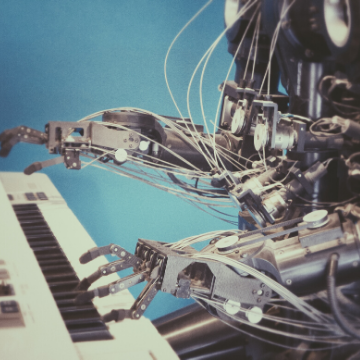Use our template to create a compelling and comprehensive RPA Consultant job description to attract top talent.
A booming technology, RPA (Robotic Process Automation) promotes productivity gains through the automation of business processes. The key: eliminating tedious tasks, streamlining operations and reducing costs. In this job description, you’ll learn about the missions, salary and skills of the RPA Consultant. A highly sought-after profile in today’s business world, particularly in digital services companies.
Also explore the role of the IoT Consultant
What is the role of the RPA Consultant?
Their role is to support the technical design of the automation of business processes in its entirety.
Definition of the RPA strategy
The first part of an RPA Consultant’s job is to define the automation strategy in close collaboration with the client or the IT department, adopting a robotic worksite planning approach. This first step involves a diagnostic to identify possible robotisation options as well as a POC (proof of concept).
Automation process implementation
Once the strategy is defined, the RPA Consultant begins configuring the tools and deploying all of the automation for each process. The key here is to work to develop new rules while respecting the constraints defined by the RPA protocol.
Tests and presentation of the robots to the teams
Finally, the RPA Consultant takes care of the unit tests and validates the functional specifications put in place. They also participate in the development of the user manual for the operational implementation of the robots and the presentation of the robots to the company’s teams.
Also read the IT Infrastructure best practices
Required skills of the RPA Consultant

Strong knowledge of software security
With an IT background, the RPA Consultant has an appetite for information systems and automation and/or robotisation. They are masters of tools such as RPA UI Path, Pega or Blue Prism.
Mastery of Agile methods
The profession of RPA Consultant requires you to know agile project management methods (Scrum, Kaban) & Cycle in V. This method recommends setting short-term objectives, dividing the project into several sub-projects. Once the first goal is reached, the team moves on to the next until the end goal is achieved. This is an agile way of working.
Rigour and curiosity
Rigour and curiosity are essential qualities for an RPA Consultant. As an expert, they must be able to use tools and working methodologies that allow them to track the progress of projects in a meticulous manner. They must also show great curiosity to constantly update their knowledge and skills.
Within the industry

Certainly, the consultant is an expert who can be found in all type of modern companies. However, it is a position that makes more sense for digital services companies and other big organisations with lots of time-consuming processes that can be easily automated. Think of insurance or book-keeping companies.
Salary of the RPA Consultant

The average daily rate ranges between €400 and €800.
Discover all the web development programming skills and professions
Training of the RPA Consultant

In conclusion, a college degree in IT can be an excellent steppingstone to this technical position. However, it is advisable to complement that degree with dedicated licenses and certifications. An advanced degree in AI and Machine Learning can help a great deal.
Are you looking for IT mission opportunities in the Tech and IT sectors on a freelance or permanent basis? Mindquest can help you find your next IT mission opportunity. Find your next mission by browsing our freelance and permanent vacancies available on our digital recruitment platform.




